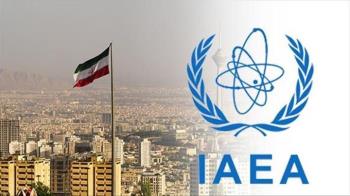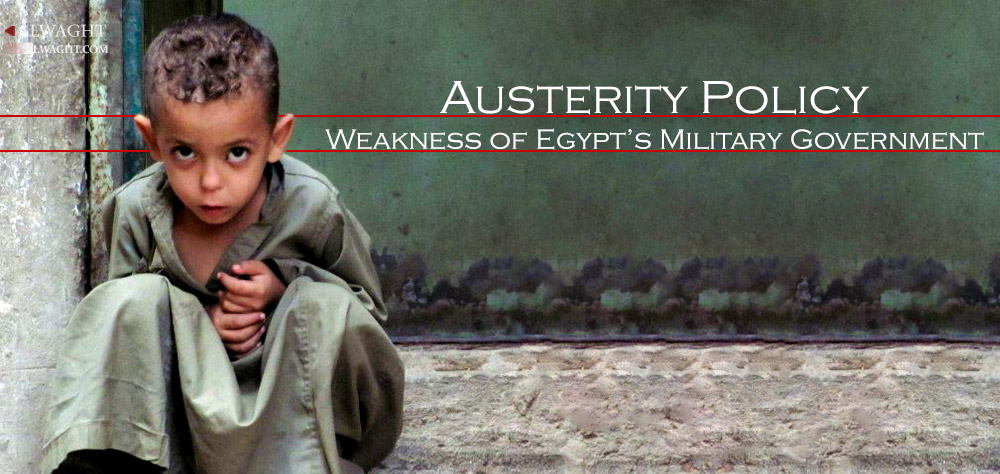Alwaght- Abdel Fattah el-Sisi’s government is leaning towards austerity policies to revive Egypt’s economy. Consequently, the government is facing the challenge of society’s acceptance or denial of such policies.
After the Egyptian revolution, the country suffered from more economical damage. Even though attempts were made in order to improve the economy, but stopping the domestic production and reducing the investments led to the downward development trend in Egypt.
The Arab Weekly has reported that the poverty rates in Egypt have increased to 27%, which is unprecedented since 2000. According to the statistics provided in that report, 27.9 percent of the Egyptian breadwinners are unemployed. The inflation rate in June rose to 14.8% which had a 6% increase compared to last year. Emirates Investment Bank has predicted that due to the increased cost of water and electricity, this figure will rise even more in the future.
Currently, Egypt’s foreign exchange reserves are at their lowest point within the last 16 months. Also, in the past month, Egypt’s currency reserves have decreased by 11% to 15 billion and 500 million dollars.
Egypt’s economic dependency on foreign aid from US and Arab countries has also damaged its economy in the past decades. Decline in crude oil prices has likewise contributed to the worsening of the economical situation in Egypt. This decrease in the international oil prices has not only reduced currency reserves, but also caused the reduction of foreign investments in this country. Since a large portion of the investments made are in the energy sector. On the other hand, this decline in oil prices has caused financial crises for other countries within the Persian Gulf region that previously were supporting Egypt.
Experts believe that Egypt should have implemented economic reforms many years ago, but fear of the negative impact of these measures on the general public had caused the Egyptian government to rely more on talks of such policies rather than actual economic reforms. Since 2014, Egypt has begun to reduce subsidies, and in the weeks leading up to the agreement with the International Monetary Fund (IMF), news about the implementation of economic reforms have surfaced in the Egyptian media. Also, the parliament is going to review the significantly opposed VAT laws.
On the other hand, it has not even been one week since the agreement with the IMF on a 12 billion dollar loan, but a number of parties, institutions and personalities of the country in a letter to Abdel Fattah el-Sisi, have condemned the loan and expressed concerns for the possible difficult economic measures that this loan might have for the people. These opponents stress that the Egyptian government should learn from the fate of countries like Mexico and Greece and instead of increasing the country’s debt, implement economic reforms.
However, the experience from previous years shows that the austerity measures in places with high poverty rate, where a large portion of the population rely on subsidies to survive, may lead to social unrest and political consequences. Anwar Sadat’s attempts of the implementation of the austerity policies led to major protests in the 70s, which were dubbed The Bread Riots.
While it has been 26 months since the start of the presidency of el-Sisi, the government has failed to reduce the economical challenges. Such that, Egypt’s budget deficit has reached 12% of gross domestic product (GDP), and IMF loan to stop the soaring budget deficits are essential for the country. Also, according to the official statistics of the Statistical Center of Egypt, the number of people that live below the poverty line of two dollars a day, from 22 million in 2014 has reached 25 million in 2016. According to the World Bank statistics, there are nearly 27 million people capable of working in Eqgypt, but 12.2% of them are unemployed.
In this situation el-Sisi knows that his government's biggest weakness is economical problems. Hence, he has asked the general public to prepare for austerity. But, it is does not look like the Egyptians are capable of withstanding more economic problems. The Economist depicts the consequences of future of el-Sisi government’s austerity programs, and forecasts a youthful and aggressive revolution in Egypt. Said magazine writes: While 40% of the Egyptian youth are unemployed, they are forced to choose between the two options of Immigration and Extremism.
The austerity measures are inevitably taken by the government to reduce costs, eliminate budget deficits, and reduce or eliminate some public services. But the critical success factor in achieving these goals is that the government should be popular and accepted by elites and political movements in social and security challenges. However, none of these are currently present in the Egyptian government. As a result the austerity policies will put pressure on poor people by increasing taxes, removal of subsidies and increases in inflation. Especially since approximately 40% of the Egyptian economy is at the hands of the military and even the previous billion dollar aids have not helped the economy. In this situation the military government might even face economic bankruptcy.



























